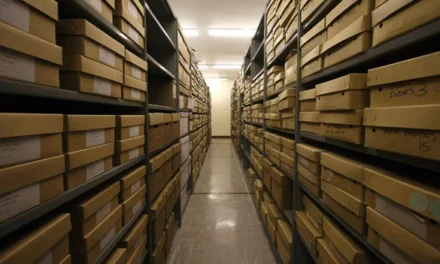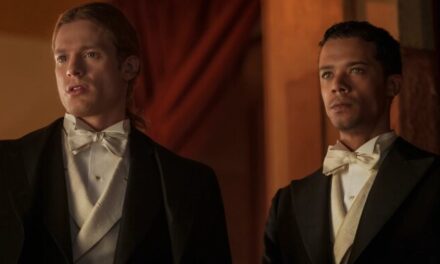Video Playtime, Ann Gray’s account of the domestic use of the VCR in the 1980s, was one of the great cultural studies accounts to come out of early television studies. In describing and analysing ‘the gendering of a leisure technology’, Gray gave space for her respondents’ accounts of their changed viewing habits and analysed them sympathetically and shrewdly. It was one of the books which suggested persuasively that the experience of television in the home was inextricably tied up with the way in which femininity was also created and experienced there. Among many other observations, it allowed women viewers to speak of how this rather alien VCR machine became theirs as they time shifted and viewed favourite programmes for their own private pleasure.
I was thinking about this over Christmas as I finally packed into plastic bags scores of bulky tapes, some going back to the 1980s, for final disposal. (I also thought about Toby Miller’s and Justin Lewis’s work on television and environmental damage but that’s another story). They’d been hanging about for many months since my VCR finally gave up. This once familiar domestic machine had not been replaced and even I, who had loved the videotape’s ease of use and portability, had moved on to the TiVo box and catchup.
But a phone call to family members elsewhere over Christmas indicated that I hadn’t in fact moved very far. They’d moved beyond the TiVo box and were in the middle of a debate about which of the hundreds of films available to them on demand they would actually watch that afternoon. Since they were studying the list in alphabetical order and were only on the A’s, they were firmly in the grip of the tyranny of choice.
For of course the TiVo box is really the VCR by other means. The crucial shift is losing (the illusion of) your own personal library and trusting to on demand services. Ben Lamb recently asked in his blog ‘Is television dying?’ As he illustrated this is not one question but several in that the answer might involve separating out some of the pleasures of television and continuing them by other means while others (less mainstream perhaps or dismissed because of gender or age discrimination) fall away. For me, television includes that habit of off-air collecting, keeping and re-viewing programmes which has been with me since the VCR first transformed the use of television.
And that of course is still possible with the TiVo box and my little collection there is as idiosyncratic and unsystematic as much of my video collection was. Once VCRs arrived, the standard answer to the question ‘Did you see such-and-such a programme?’ became ‘No but I recorded it’ and, as with the VCR, there are programmes recorded in hope but still awaiting the time of viewing. But on the box is a collection of programmes which somehow I feel the need to keep for myself and that enables me to follow the example of Geoff Lealand and offer if not the best programmes of 2014, or even the most typical, at least a sample of what I watched and felt was worth keeping at least into 2015:

1. Line of Duty, series 2 (BBC). Better than series 1 and one of a number of police series saved. Picked out for its formidable ‘heroine’ and its brilliant use of the police procedural format which made the interview scenes as gripping and tense as any action sequence. By contrast, The Fall, series 2, BBC, confirmed the problems of series 1 and made the exploitative elements of first series worse by its heavy handling of plot and theme. The use of the violent, abusive husband as a bit part/deus ex machina in the final episode is but one example of this.

2. Less trumpeted than the Nordic crimmies, the Danish The Legacy (Arvingerne), DR Fiktion, has so far proved intriguing (it’s not finished yet). The story of siblings split by their family inheritance, it eschews the demands that characters in television drama should go on a journey but shows that decisions have consequences and that even good intentions won’t save you. None of the characters is actually very likeable but their individual actions are both understandable and disastrous and the performances are great. And to property-obsessed English viewers the house at the centre of the row does look very desirable!

3. Hamish Macbeth (1995-97, BBC). While Scotland debated the referendum a channel showing old drama re-ran some episodes of this series. The pleasures include Robert Carlyle as the young policeman maintaining his own form of order over the picturesque if unruly village, some sly jokes and surrealist scenarios. Back episodes of Taggart (1983-STV/ITV) are currently piling up to fill the same nostalgic, afternoon-watching category.

4. Actually my box shows quite a lot of Scottish leanings this year as two very different documentaries show. Series 2 of The Secret History of Our Streets (BBC/OU), had an episode on growing up in a tenement in Glasgow and the fight to upgrade the building rather than replace it with a tower block. And Great Scots – The Writers Who Shaped a Nation ( BBC), threw poet and nationalist, the bizarre Hugh MacDiarmid, into the debate about an independent Scotland.

5. Mysteries of Lisbon/Mistérios de Lisboa (2011, Radiotelevisão Portuguesa) Raul Ruiz’s melodrama was re-cut and screened in two parts as a film but I’m glad I saw it at a television drama in six hour-long parts. Often baffling, with mysterious characters gliding in and out of empty rooms as the secret lives of the central characters are elegantly revealed, I’m planning to re-view it in one intense session on a dark winter’s day.

6. The Roosevelts: An Intimate History (PBS). This is the first time I’ve even contemplated watching one of Ken Burns’ epics in full. This seven-part, fourteen hour film tells us about Theodore, Franklin and Eleanor Roosevelt with a particular emphasis on their personal lives. Although the visual material is fascinating and the voice-overs mesmerizing, I find myself treating this as a book, refusing to be dictated to by the very lengthy episode format. This could of course be the reason why I haven’t got to the end of it yet!
I’m sure that many of these programmes and the others still sitting (sometimes for years) in my box are available by other means. But the point is that this is my off air collection, saved (as with the VCR) for a variety of reasons and covering the different moods and situations in which I watch television. There’s a small pleasure in this and in the fact that, because I’ve already done the choosing, I don’t have to work my way through an endless catch-up list to find something I might want to watch.
Christine Geraghty is an Honorary Professorial Fellow at the University of Glasgow. Her publications on television include a contribution to the 1981 BFI monograph on Coronation Street; Women and Soap Opera (Polity, 1991); and My Beautiful Laundrette (I B Taurus, 2004). Her BFI TV Classic on Bleak House was published in 2012 and her reflections on the beginning of her work on soap opera appears in ‘The BFI women and film study group 1976 – ?’, Renewing Feminisms, Radical Narratives, Fantasies and Futures in Media Studies H. Thornham and E. Weissmann (eds) I B Taurus 2013. She is on the editorial board of the Journal of British Cinema and Television and sits on the advisory boards of a number of journals, including Screen.




